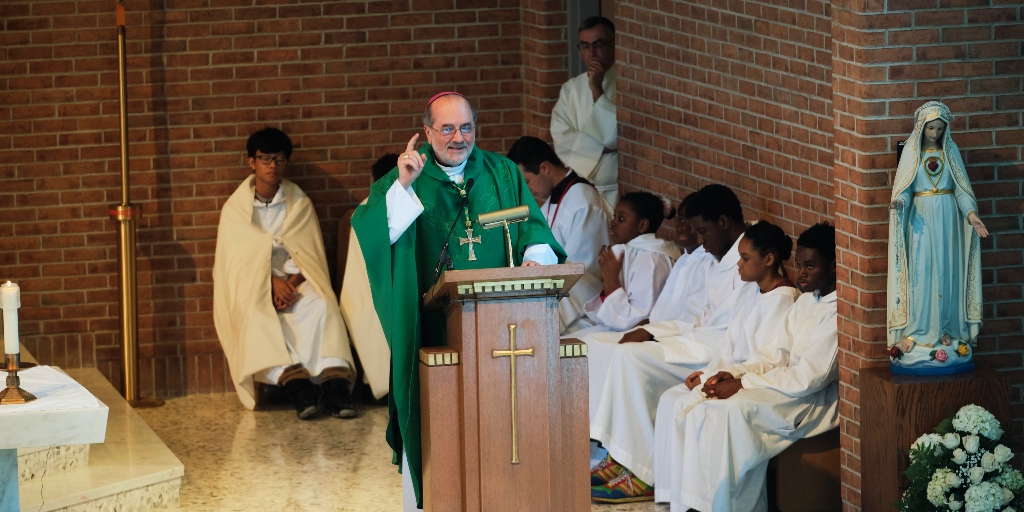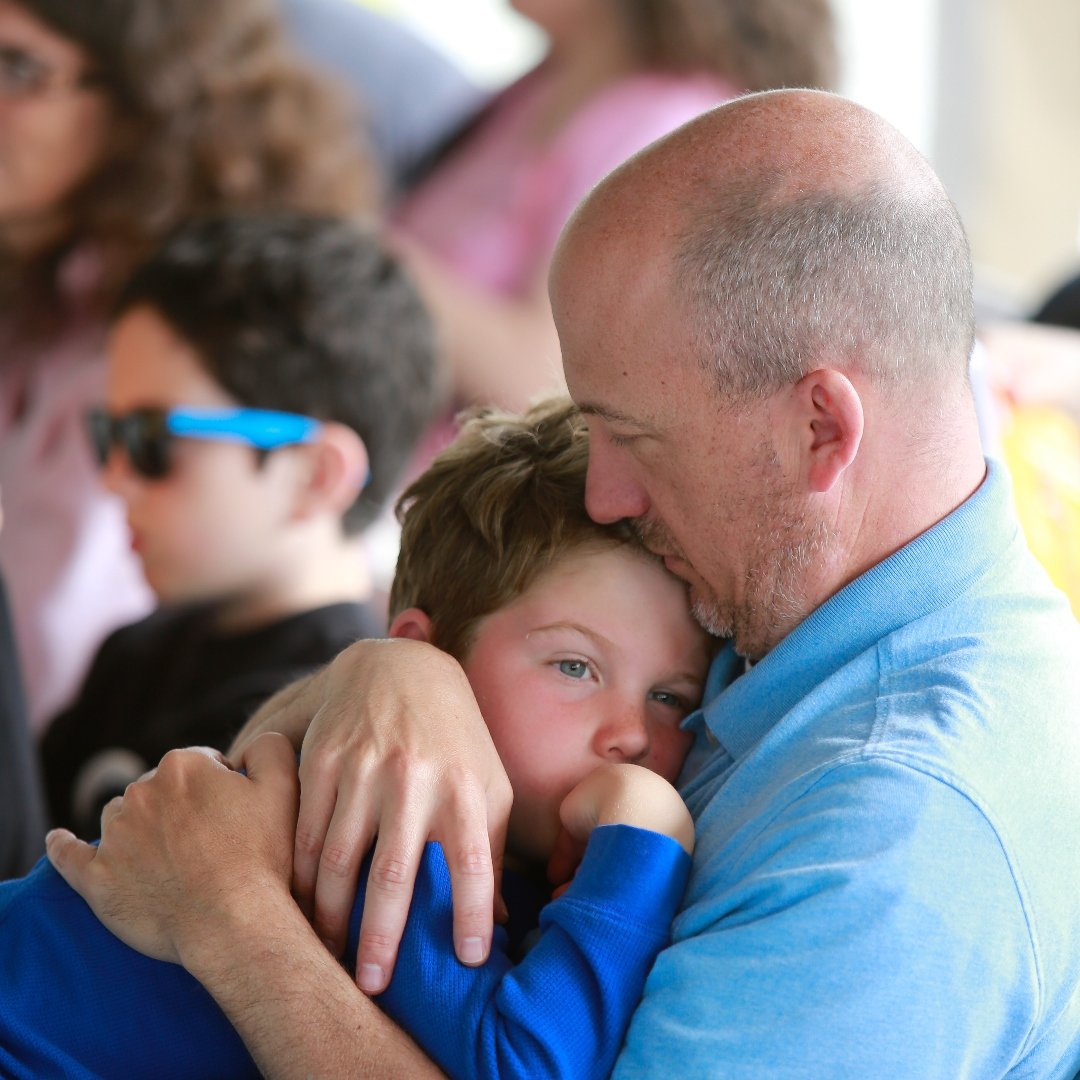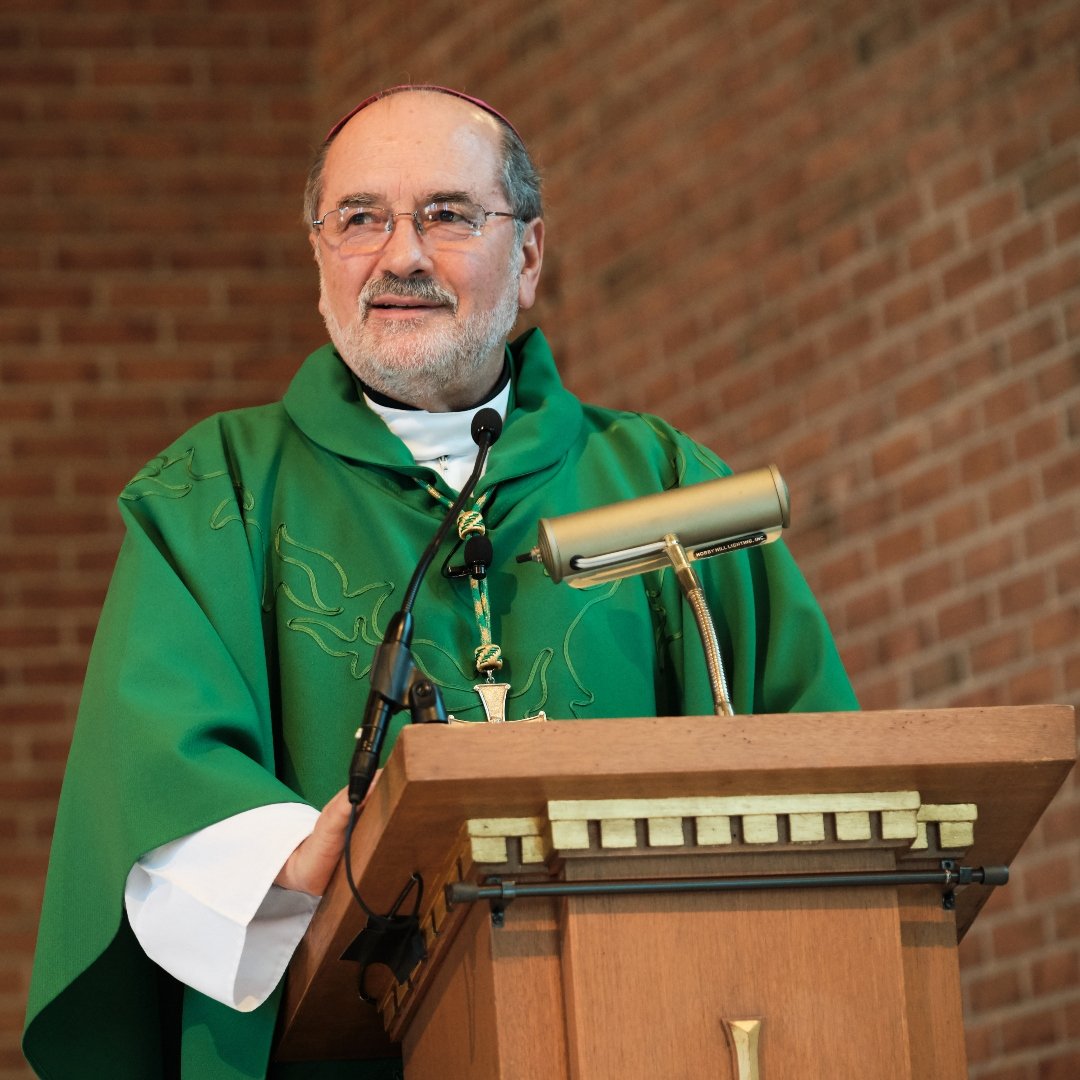
AnneMarie Miller discusses what we can do when topics at Mass are challenging for young ears.
Our young children have a certain joy, sparkle, and innocence. Who wants to dump the world’s problems of sin, death, and suffering on them? Yet, they will inevitably encounter these things in their lives–and often, they will encounter them in the liturgy.
The entire season of Lent places a particular focus on Christ’s sufferings, and the Passion Narrative that is proclaimed on Palm Sunday can be chilling even for adults to hear. Holy Thursday closes on a somber note, and Good Friday is stark and sad. Funeral Masses recognize the ever-present reality of death, often through the presence of the deceased person’s body in the casket or an urn with his or her ashes.
Furthermore, we all sin and live in a fallen world. Priests sometimes address the topic of sin and temptation in their homilies, for the homily—as the General Instruction of the Roman Missal notes—“is necessary for the nurturing of the Christian life [...] and should take into account both the mystery being celebrated and the particular needs of the listeners” (#65). We, as sinners, need guidance, help, and direction from our priests.
However, all of this suffering, death, and sin may not, at first glance, look very “kid-friendly.” Parents of young kids choose to address this challenge in different ways. Some parents may decide to keep their young children away from liturgies that deal with uncomfortable topics, such as funeral Masses and Good Friday services. Other parents might bring books to entertain their children during the Sunday homily, in case a topic like sin is discussed—hoping that their kids are unaware of what is being said.

In our family, my husband and I have taken a slightly different approach: we bring our young kids to Mass, and we sustain ongoing conversations about what we experience there. For example, several weeks before we attended Mass on “Safe Haven Sunday,” (when pastors are encouraged to address pornography) we had already discussed this topic several times in our home.
We also recently had a death in our parish, so I took my three kids—all under the age of six—to the funeral Mass. Even though my small toddler had some challenges staying quiet and happy for the long liturgy, it was a really beautiful experience for my kids and me.
Beforehand, I talked with them about what different things we may see in the church. We arrived a little early so that we could quietly look at the open casket and the church and discuss what we each noticed. Together, we reflected on the eternal life with God in Heaven that we are all called to. Attending that funeral was a fantastic way to pray for someone who had died, and it was also a good way to teach my children about the beautiful rites of the Church that accompany us through life and death.
I was also struck by the profound way that Catholic funerals can introduce our children to challenging topics like suffering and death. My children were able to see people grieve as they suffered in the aftermath of a woman’s death, but they could also see the joyful hope that God offers. From the white pall to the lit Easter candle, they beheld visible reminders of both Baptism and of Christ’s resurrection.
In the Catechesis of the Good Shepherd atrium, we often remind young children that “God’s light is stronger than darkness, and His love is stronger than death.” Together, my kids and I could see this truth at the funeral liturgy. As we continue conversations about sin and brokenness in our home and Church, we need to present this truth to our children over and over.

’m still very new to parenting, but this approach has benefited us. Instead of hoping that the priest doesn’t preach about a certain topic and trying to keep my children from listening to the homily (plus, they have a tendency to absorb what’s being said, even if I don’t think they are listening), and rather than keeping them away from important liturgies like those of the Triduum or funerals, initiating conversations before or after Mass has been helpful
Our conversations don’t have to be lengthy or intense; even just a simple check-in with our young kids is an opportunity for a short discussion. When they have questions, we take those seriously and help them find answers or reflect further on them. As they grow older, I know we’ll be able to circle back on different topics and add more layers of understanding.
Whether it’s at Mass, in religious education classes, on the playground, or in the library, our young children will—in some way—encounter sin, brokenness, and suffering. Rather than despairing at the darkness, let’s lift up the hope and joy of Christ as we proactively help our little ones navigate life in this world.
Copyright 2022 AnneMarie Miller
Images: copyright 2017, 2019 Holy Cross Family Ministries, all rights reserved.
About the Author

AnneMarie Miller
A bibliophile, wife, mother of young children, and lover of the Liturgy, AnneMarie Miller enjoys exploring the manifold—and quirky—ways in which God speaks. She can often be found reading books to her kids, burrowing her toes in the red Oklahoma dirt, or sipping black coffee. Her reflections on Catholicism, literature, and hope can be found on her blog, Sacrifice of Love.


.png?width=1806&height=731&name=CatholicMom_hcfm_logo1_pos_871c_2728c%20(002).png)
Comments